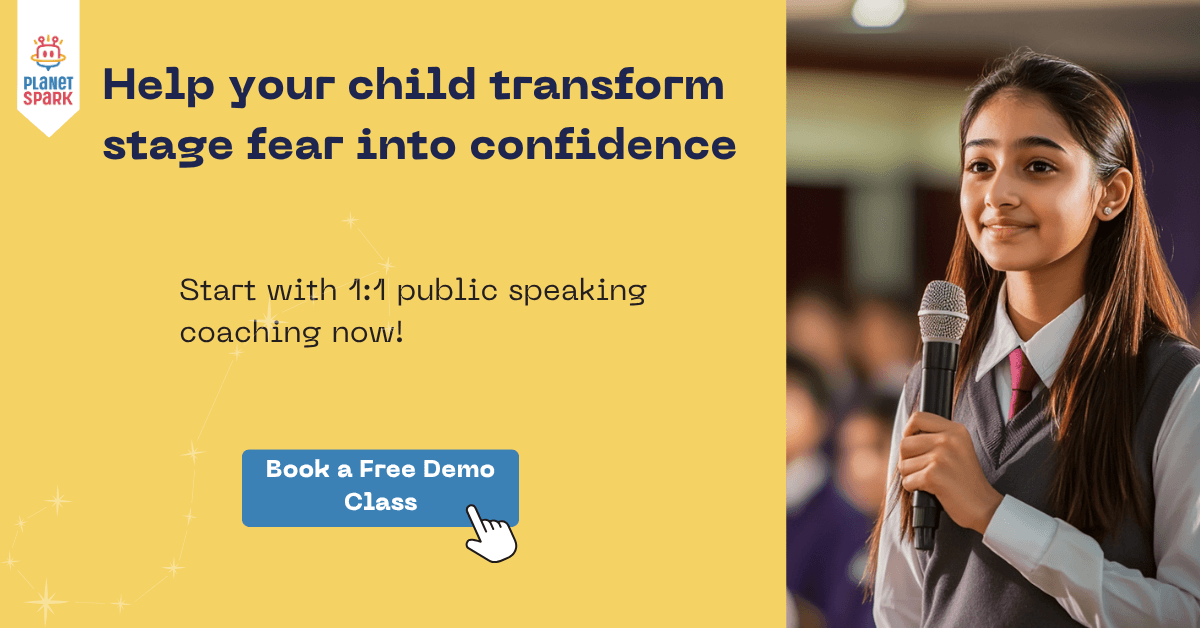Why We Fear Public Speaking and How to Overcome It
Last Updated At: 25 Sep 2025
9 min read

Have you ever felt your heart race, palms sweat, or mind go blank just at the thought of speaking in front of a crowd? You are not alone. The fear of public speaking, also known as glossophobia, is one of the most common fears worldwide, affecting students, professionals, and even experienced speakers. While it can feel overwhelming, this fear doesn’t have to hold you back.
Understanding why we feel anxious and learning practical ways to manage it can help you speak confidently, engage your audience, and turn public speaking into a skill rather than a source of stress. In this blog, we will explore the reasons behind this fear and share actionable strategies to overcome it effectively.
Understanding the Fear of Public Speaking
Public speaking is one of the most common sources of anxiety for people of all ages. Whether it’s a student presenting in class, an employee addressing colleagues, or a speaker on stage, many experience nervousness and fear. This fear, often called glossophobia, is not just about shyness—it’s a complex mix of psychological and physical reactions that can make even experienced speakers uneasy. Understanding why this fear occurs is the first step toward overcoming it.
Causes of the Fear
Fear of Judgment:
One of the primary reasons people fear public speaking is the worry about how others will perceive them. Thoughts like “What if I make a mistake?” or “Will they laugh at me?” can create a cycle of anxiety that increases stress before and during the speech.Past Negative Experiences:
Previous experiences, such as forgetting lines, stuttering, or receiving criticism, can leave lasting impressions. These experiences make individuals more cautious and anxious, anticipating a repeat of past failures.Perfectionism:
People who aim for perfection often put immense pressure on themselves to deliver flawless speeches. This high expectation can make small mistakes feel catastrophic, amplifying fear and self-doubt.Lack of Experience or Practice:
Many people fear public speaking simply because they haven’t had enough opportunities to practice. Without familiarity, even small audiences can feel intimidating, and uncertainty about how to start or structure a speech can increase nervousness.Biological Response to Stress:
The human body reacts to perceived threats with the “fight or flight” response. Public speaking can trigger this response, causing physical symptoms like a racing heart, sweaty palms, shaky voice, dry mouth, or even dizziness. These physical reactions, in turn, increase the psychological feeling of fear.
Help your child overcome the fear of public speaking with PlanetSpark.
Book a Free Demo Today!
Psychological and Physical Effects
Mind Going Blank: Anxiety can make it difficult to recall points or organize thoughts.
Heightened Self-Consciousness: Speakers may feel every eye is on them, intensifying nervousness.
Avoidance Behavior: Fear may cause people to skip opportunities to speak, which can impact academics, career growth, and personal development.
Stress Symptoms: Headaches, muscle tension, and stomach discomfort often accompany the fear of public speaking.
Understanding these causes and effects helps normalize the fear. It shows that nervousness is a natural reaction rather than a personal flaw. Recognizing that even experienced speakers feel anxious at times can empower individuals to manage their fear effectively.
How to Overcome the Fear of Public Speaking
Overcoming the fear of public speaking is possible with practice, preparation, and the right mindset. Here are proven strategies that can help anyone—from students to professionals—speak confidently in front of an audience.
1. Prepare Thoroughly
Preparation is the key to confidence. Know your topic inside out and organize your ideas clearly. Create a simple outline with key points so you always know what to say next. Practicing your speech multiple times reduces uncertainty and builds familiarity with your content.
2. Start Small
Begin by speaking in front of a small group of friends or family. Gradually increase your audience size as your confidence grows. Small, manageable steps make the process less intimidating and help build self-assurance over time.
3. Practice Relaxation Techniques
Breathing exercises, meditation, or light stretching can calm nerves before speaking. Take a few deep breaths to lower your heart rate and focus your mind. Relaxation reduces physical symptoms of anxiety, making you feel more composed.
4. Positive Visualization and Self-Talk
Visualize yourself delivering a successful speech. Imagine the audience reacting positively and yourself speaking confidently. Replace negative thoughts like “I’ll mess up” with affirmations such as “I am prepared and capable”. Positive mental reinforcement strengthens confidence.
5. Focus on the Message, Not Yourself
Shift your attention from how you are being perceived to the value of your message. When you focus on helping or informing the audience, anxiety decreases. Remember, the audience is there to listen, not to judge.
6. Engage With the Audience
Make eye contact, ask questions, and involve listeners in your speech. Engaging the audience helps you feel connected and reduces self-consciousness. Interaction makes the experience more natural and less intimidating.
7. Join Public Speaking Programs or Workshops
Organizations like PlanetSpark, Toastmasters, or school speaking clubs provide structured practice, feedback, and mentorship. These programs create safe spaces to practice and gradually build confidence through repeated exposure.
8. Accept Mistakes and Learn from Them
Even experienced speakers make mistakes. Treat errors as learning opportunities rather than failures. Each speech, whether perfect or imperfect, is a step toward improvement.
9. Record and Review Yourself
Recording your practice sessions and reviewing them can help you notice areas for improvement. It also allows you to see progress over time, boosting confidence and reducing fear.

Common Reasons People Fear Public Speaking
Even though public speaking is a valuable skill, many people avoid it because of deep-seated fears. Understanding the common reasons behind this fear can help individuals address it effectively.
1. Fear of Judgment or Criticism
One of the strongest reasons people feel anxious is the worry that the audience will judge them. Thoughts like “What if I sound silly?” or “Will they notice my mistakes?” can trigger intense anxiety. This fear of negative evaluation often makes people focus more on themselves than on their message.
2. Lack of Preparation or Practice
Being unprepared is a major contributor to public speaking anxiety. When speakers don’t know their content well or haven’t practiced enough, nervousness skyrockets. Even confident individuals may feel vulnerable without rehearsal, leading to mistakes and heightened fear.
3. Perfectionism and High Expectations
Perfectionists often feel that every word, gesture, and pause must be flawless. This pressure can cause stress before and during a speech, making small errors feel overwhelming. Fear of imperfection often prevents people from speaking at all.
4. Negative Past Experiences
A previous embarrassing or uncomfortable experience, like forgetting lines, stumbling over words, or receiving criticism, can create a lasting fear of public speaking. These experiences act as mental roadblocks, making individuals anticipate failure in future speaking situations.
5. Fear of the Unknown
Sometimes, fear arises from uncertainty. Not knowing the audience, environment, or how they will react can make speakers anxious. Unfamiliar settings amplify self-doubt and make public speaking appear more intimidating than it actually is.
6. Physical Symptoms of Anxiety
Even before speaking, the body can react with a rapid heartbeat, sweaty palms, shaky voice, or stomach discomfort. These physical reactions can reinforce fear, creating a cycle of anxiety where the speaker becomes more self-conscious about these symptoms.
7. Lack of Confidence
Finally, a general lack of confidence in one’s abilities, whether in speaking, articulation, or knowledge of the topic, can increase fear. Low self-esteem can make the audience seem critical and magnify nervousness.
Experience PlanetSpark’s Public Speaking Classes!
Schedule your free demo and unlock confident communication.
Tips for Confident Public Speaking
Stand Tall: Good posture boosts confidence and supports clear speaking.
Make Eye Contact: Connect with your audience to engage them effectively.
Speak Slowly and Clearly: Avoid rushing; pause to emphasize key points.
Use Gestures: Natural hand movements and facial expressions make your speech lively.
Start with a Story or Example: Grab attention and make your speech memorable.
Practice and Visualize: Rehearse your speech and imagine delivering it confidently.
Celebrate Small Wins: Every successful attempt builds confidence for the next time.
Learning Public Speaking with PlanetSpark
PlanetSpark helps children overcome the fear of public speaking through fun, interactive, and structured learning.
Expert Guidance: Certified teachers provide personalized support and feedback.
Interactive Activities: Storytelling, role-plays, and presentations make practice engaging.
Confidence Building: Step-by-step exercises help children speak clearly and confidently.
Real-Life Application: Students learn to express themselves naturally in school, competitions, and daily life.
Fun Learning Environment: Gamified sessions and interactive classes make public speaking enjoyable.
With PlanetSpark, children not only learn public speaking skills but also develop confidence, communication, and self-expression in a supportive environment.
Readers Also Read
Positive Body Language for Kids – Learn how gestures and expressions can boost confidence in public speaking.
Speak and Improve English – Practical tips and exercises to enhance English speaking skills.
Conclusion
Fear of public speaking is a common challenge, but it can be overcome with the right strategies, practice, and mindset. By understanding the causes of anxiety, preparing thoroughly, starting small, and using practical tips, anyone can become a confident speaker. Programs like PlanetSpark provide structured guidance and interactive learning, helping children and beginners develop strong communication skills while reducing fear. With patience and consistent effort, public speaking can transform from a source of stress into an empowering skill.
FAQs
Q1. What causes fear of public speaking?
Fear of public speaking often arises from anxiety, fear of judgment, lack of preparation, or past negative experiences.
Q2. Can anyone overcome the fear of public speaking?
Yes! With practice, proper techniques, and mindset shifts, anyone can become a confident speaker.
Q3. How can children improve their public speaking skills?
Children can practice through storytelling, role-plays, interactive classes, and guidance from expert teachers.
Q4. What are simple ways to calm nerves before speaking?
Deep breathing, positive visualization, and practicing in front of a small audience can help calm nerves.
Q5. How does PlanetSpark help in overcoming public speaking fear?
PlanetSpark offers structured lessons, interactive activities, and expert support to build confidence, communication skills, and comfort in speaking publicly.
Personalized Communication Report
Record a video to get a AI generated personalized communication report for your child
Select Learner's Class

Hi There, want to try these
tips for your child with
LIVE with our expert coach?
Let's check your child's
English fluency

